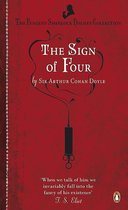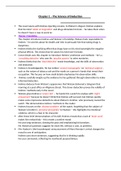Chapter 1 – The Science of Deduction
The novel opens with Holmes injecting cocaine, to Watson’s disgust. Holmes explains
that his mind ‘rebels at stagnation’ and drugs stimulate his brain – he takes them when
he doesn’t have a case to work on.
Theme: Friendship
The chapter introduces Holmes and Watson’s friendship. Watson feels responsible for
Holmes – he worries about his health and tries to persuade him that taking drugs is
dangerous.
Holmes thinks the clarifying effect that drugs have on his mind outweighs the negative
physical effects. This shows that he values his mind over his body.
Conon Doyle uses this chapter to introduce Holmes’ profession and methods – he’s a
‘consulting detective’ who uses his ‘peculiar powers’ to solve mysteries.
Holmes thinks that the ‘ideal detective’ needs knowledge, and the skills of observation
and deduction.
Holmes is knowledgeable. He has written ‘several monographs’ on ‘technical subjects’,
such as the nature of tobacco ash and the marks on a person’s hands that reveal their
occupation. This focuses on how small details emphasises his observation skills.
Holmes carefully weighs up the evidence he has gathered through observation to make
informed deduction.
Holmes deduces from Watson’s appearance that Watson delivered a telegram that
morning at a post office on Wigmore Street. This clever deduction proves the validity of
Holmes’ methods early in the novel.
Watson gives Holmes a ‘severe test’ – he hands him a watch to analyse with ‘slight
amusement’ because he doesn’t think that Holmes will succeed, but Holmes quickly
makes some impressive deductions about Watson’s brother, who previously owned the
watch. This demonstrates Holmes’ methods to the reader.
Holmes focuses on the ‘abstract problem’ of the watch, forgetting that the subject of
Watson’s brother is ‘personal and painful’ to Watson – this highlights his emotional
coldness, which is a flaw in his character.
After these brief demonstrations of his skill, Holmes reveals that a lack of ‘brain-work’
makes him melancholy – this creates a sombre mood:
He uses long sentences, slowing the pace and emphasising his boredom.
His rhetorical questions suggests he views life, without a case, as pointless.
Mrs Hudson’s (the housekeeper) announcement of Mary Morstan’s arrival changes the
mood to one of anticipation:
Holmes uses short sentences, suggesting that he is thinking rapidly.
He uses commands, reflecting his newfound purposefulness.
The novel opens with Holmes injecting cocaine, to Watson’s disgust. Holmes explains
that his mind ‘rebels at stagnation’ and drugs stimulate his brain – he takes them when
he doesn’t have a case to work on.
Theme: Friendship
The chapter introduces Holmes and Watson’s friendship. Watson feels responsible for
Holmes – he worries about his health and tries to persuade him that taking drugs is
dangerous.
Holmes thinks the clarifying effect that drugs have on his mind outweighs the negative
physical effects. This shows that he values his mind over his body.
Conon Doyle uses this chapter to introduce Holmes’ profession and methods – he’s a
‘consulting detective’ who uses his ‘peculiar powers’ to solve mysteries.
Holmes thinks that the ‘ideal detective’ needs knowledge, and the skills of observation
and deduction.
Holmes is knowledgeable. He has written ‘several monographs’ on ‘technical subjects’,
such as the nature of tobacco ash and the marks on a person’s hands that reveal their
occupation. This focuses on how small details emphasises his observation skills.
Holmes carefully weighs up the evidence he has gathered through observation to make
informed deduction.
Holmes deduces from Watson’s appearance that Watson delivered a telegram that
morning at a post office on Wigmore Street. This clever deduction proves the validity of
Holmes’ methods early in the novel.
Watson gives Holmes a ‘severe test’ – he hands him a watch to analyse with ‘slight
amusement’ because he doesn’t think that Holmes will succeed, but Holmes quickly
makes some impressive deductions about Watson’s brother, who previously owned the
watch. This demonstrates Holmes’ methods to the reader.
Holmes focuses on the ‘abstract problem’ of the watch, forgetting that the subject of
Watson’s brother is ‘personal and painful’ to Watson – this highlights his emotional
coldness, which is a flaw in his character.
After these brief demonstrations of his skill, Holmes reveals that a lack of ‘brain-work’
makes him melancholy – this creates a sombre mood:
He uses long sentences, slowing the pace and emphasising his boredom.
His rhetorical questions suggests he views life, without a case, as pointless.
Mrs Hudson’s (the housekeeper) announcement of Mary Morstan’s arrival changes the
mood to one of anticipation:
Holmes uses short sentences, suggesting that he is thinking rapidly.
He uses commands, reflecting his newfound purposefulness.



